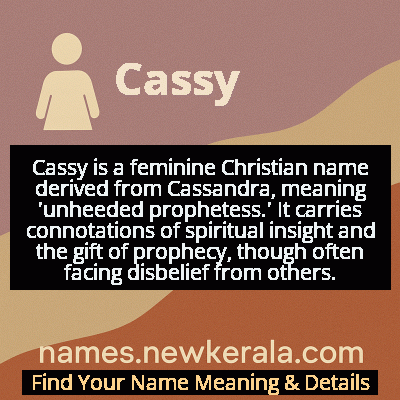Cassy Name Meaning & Details
Origin, Popularity, Numerology Analysis & Name Meaning of Cassy
Discover the origin, meaning, and cultural significance of the name CASSY. Delve into its historical roots and explore the lasting impact it has had on communities and traditions.
Name
Cassy
Gender
Female
Origin
Christian
Lucky Number
4
Meaning of the Name - Cassy
Cassy is a feminine Christian name derived from Cassandra, meaning 'unheeded prophetess.' It carries connotations of spiritual insight and the gift of prophecy, though often facing disbelief from others.
Cassy - Complete Numerology Analysis
Your Numerology Number
Based on Pythagorean Numerology System
Ruling Planet
Uranus (Rahu)
Positive Nature
Strong sense of order, loyal, practical, and disciplined.
Negative Traits
Stubborn, overly serious, rigid, and prone to feeling restricted.
Lucky Colours
Blue, gray.
Lucky Days
Saturday.
Lucky Stones
Blue sapphire.
Harmony Numbers
1, 7, 8.
Best Suited Professions
Managers, engineers, accountants, organizers.
What People Like About You
Dependability, discipline, practicality.
Famous People Named Cassy
Cassy O'Connor
Politician
Australian politician who served as Leader of the Tasmanian Greens and Member for Clark
Cassy
DJ/Producer
Internationally renowned electronic music DJ and producer from Germany, known for her techno sets and productions
Cassy Tully
Equestrian
Irish equestrian and veterinary surgeon specializing in sport horse medicine and rehabilitation
Cassy Legaspi
Actress/Singer
Filipino actress and singer known for her roles in various television dramas and musical performances
Name Variations & International Equivalents
Click on blue names to explore their detailed meanings. Gray names with will be available soon.
Cultural & Historical Significance
The name embodies the tension between knowledge and acceptance, making it culturally symbolic of intuitive wisdom that challenges conventional thinking and societal norms. Throughout Western literature and art, characters named Cassy or Cassandra frequently appear as figures of foresight and warning, their narratives exploring the consequences of ignoring wise counsel and the moral responsibility that comes with special insight. This cultural legacy gives the name depth and philosophical weight, connecting modern bearers to ancient themes of truth, perception, and the human tendency to reject uncomfortable realities.
Extended Personality Analysis
Individuals named Cassy are often characterized by strong intuitive abilities and perceptive insights that allow them to read situations and people with remarkable accuracy. They tend to possess a natural wisdom beyond their years, often seeing patterns and outcomes that others miss, which can make them seem prophetic or unusually insightful. This heightened awareness frequently comes with a sense of responsibility to share their observations, though they may sometimes feel frustrated when their warnings or advice go unheeded.
Cassys typically demonstrate emotional intelligence and empathy, making them excellent confidantes and advisors who understand human nature deeply. They often balance this serious insight with warmth and approachability, creating a personality that is both wise and relatable. Many Cassys develop strong communication skills as they learn to present their insights in ways that others can accept and understand, turning their natural perceptiveness into a valuable leadership quality. Their combination of intuition, emotional depth, and practical wisdom makes them particularly effective in roles requiring mediation, counseling, or creative problem-solving.
Modern Usage & Popularity
In contemporary usage, Cassy remains a popular feminine name that strikes a balance between traditional roots and modern appeal. While it peaked in popularity during the 1980s and 1990s, it continues to be chosen by parents seeking a name that is both classic and approachable. The spelling 'Cassy' is less common than 'Cassie,' giving it a slightly more distinctive quality while maintaining the same phonetic appeal. Modern Cassys often appreciate their name's connection to strength and intuition, with many embracing the mythological heritage as a source of personal identity. The name maintains steady usage across English-speaking countries and has seen particular popularity in Australia, the United Kingdom, and the United States. Its versatility allows it to work well in professional settings while retaining a friendly, accessible quality that suits various personality types and life paths, ensuring its continued relevance in the 21st century.
Symbolic & Spiritual Meanings
Symbolically, Cassy represents the archetype of foresight and unheeded wisdom, embodying the tension between knowledge and belief. The name carries connotations of prophetic insight and the burden that comes with seeing what others cannot or will not acknowledge. It symbolizes the struggle for truth in a world that often prefers comfortable illusions, making it emblematic of courage in speaking difficult truths. Cassy also represents transformation and resilience, as the mythological Cassandra's story involves overcoming the curse of disbelief through persistence and integrity. The name suggests a bridge between intuitive understanding and rational thought, symbolizing the integration of different ways of knowing. In spiritual contexts, Cassy can represent the soul's journey toward enlightenment through facing rejection and maintaining faith in one's perceptions despite external skepticism, making it a powerful symbol of inner truth and personal conviction.

